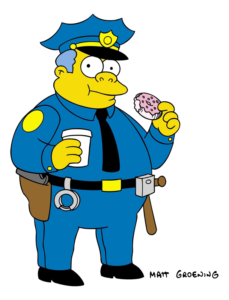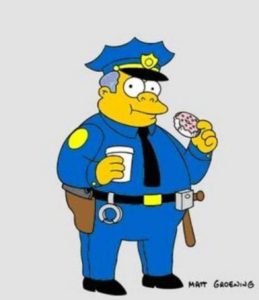Slang dictionary
cop
[kop]
What does cop mean?
A cop is an informal term for a police officer. As a verb, cop is used in a variety of slang expressions meaning “grab” or “obtain,” from copping a feel on someone (not recommended) to copping out on going to a party (= not going) to copping to (confessing to) eating the last slice of pizza.
Where does cop come from?

The many, seemingly unrelated, meanings of cop start to make sense when you know where the word comes from. Via French, cop ultimately comes the Latin capere, or “to seize, snatch, take, grab.”
Cop became slang for “seizing” in the early 1700s. This verb may have given rise to copper, thieves’ slang for “law enforcement” by the 1840s and shortened to cop by the 1850s. For much of its history, it was often seen as dismissive or derogatory, though most police officers are just fine with it in contemporary use.
Other theories root cop as an acronym for constable on patrol (unlikely) or as a reference to copper badges early policemen wore in New York (probably influenced the term).
Cop has taken on verb many other senses in the 20th century. We can find cop a feel, or “to grope someone,” in the 1930s as well as to cop to something, or “confess.” We can find cop on, or “understand something,” in the 1940s, the same decade there’s evidence for cop out, or “give up.” In the 1950s, we can find to cop as in to obtain illegal drugs.” We can find cop an attitude, or “assume an adamant stance,” in the 1970s.
Anybody else’s dog cop an attitude when you tell them no or is it just mine?
— T Y (@SandersTyler21) November 28, 2018
Cop has many other senses in English outside the US. The more British expression fair cop, or “an admission of wrongdoing,” was notably used in the 1975 Monty Python and Holy Grail.
Examples of cop
Who uses cop?
Cop is all about context. As a verb, it shows up in a great number of expressions variously dealing with “grabbing,” from copping feels, attitudes, and drugs. Other verbal cops bring us back to legal territory, like copping to crimes and copping pleas. A cop-out is also a common expression for an “excuse.”
Bayonne 13-year-olds return X-Box to classmate after copping to burglary http://t.co/hyneuwIn6L
— NJ.com (@njdotcom) May 21, 2013
“Never quit. It is the easiest cop-out in the world. Set a goal and
don’t quit until you attain it. When you do… https://t.co/SZdKIsJPBi— Leonard Johnson (@chang40) November 29, 2018
Law enforcement officers use cop as a convenient, gender-neutral term that can apply across various agencies. They’ve captivated our cultural imagination. Ice-T faced massive backlash in 1992 for his song “Cop Killer.” Ironically, he’s been playing a cop on Law and Order: SVU since 2000.

Zimbio
Cop movies are incredibly popular, including Beverly Hills Cop (1984), RoboCop (1987,) Kindergarten Cop (1990,) Cop and a Half (1993, RIP Burt Reynolds), Timecop (1994,) Cop Land (1997,) Paul Blart, Mall Cop (2009,) and our favorite, the 1991 cinematic masterpiece that is Samurai Cop. The reality TV show Cops has been going strong since 1989

Professional Moron
Note
This is not meant to be a formal definition of cop like most terms we define on Dictionary.com, but is rather an informal word summary that hopefully touches upon the key aspects of the meaning and usage of cop that will help our users expand their word mastery.
